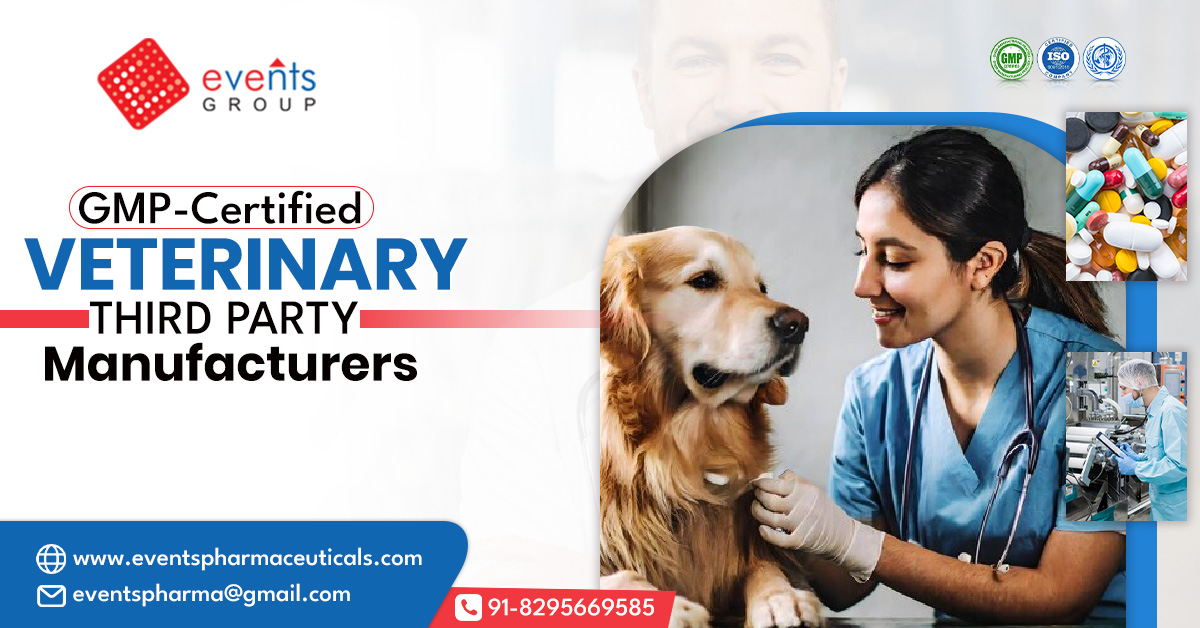
Introduction
Over 535 million animals live in India, making it the largest livestock nation in the world. India’s large base of animal husbandry has led to a steadily increasing demand for quality veterinary medicines. So due to that reason, demand for WHO-GMP certified veterinary manufacturers is rising constantly. Hence, India’s veterinary pharmaceutical industry is worth ₹7,000 crore, with an estimated five-year compound annual growth rate (CAGR) of 10%. Animals constitute the backbone of India’s economy, with an estimated 20% of rural households relying on livestock for their livelihood.
To maintain the health of animals, prevent disease outbreaks, and ensure food safety, there is a need to use safe, effective, and regulated drugs. In such circumstances, WHO-GMP licensed veterinary producers can become an important part of the equation. Let us see why the WHO-GMP certification is not only required but also mandatory.
How do WHO-GMP certified veterinary manufacturers protect animal and public health?
Numerous outbreaks of avian influenza, brucellosis, foot-and-mouth disease, and other zoonotic animal diseases are occurring in India. Moreover, they pose great threats not just to livestock but to public health and the economy as well. Substandard veterinary medicines can ultimately worsen the situation. Hence, this condition causes drug resistance, leading to treatment failures and monetary loss to farmers. WHO-GMP certified veterinary third party manufacturers adhere to internationally recognised quality standards. They keep each of their product batches clean, active, and decontaminated. Furthermore, this consistency is essential, not only to maintain animal health but also to prevent diseases from jumping between species.
This strict quality framework ensures:
• Accurate dosing to prevent antibiotic resistance
• Sterile products to avoid infections
• Consistent formulations for reliable treatment
• Complete traceability in case of recalls or audits
Since more than 70% of India’s population consumes food of animal origin. Veterinary medicine is backed by personnel and services to keep things productive. Suffering animals means decreased milk, meat, and eggs production. Moreover, greater productivity correlates with higher farmer incomes.
Where does GMP make the biggest difference in veterinary production?
From raw materials to real safety
All veterinary medicines come from raw materials. If the ingredients are unsafe or contaminated, the resulting medicine will not work. GMP-approved veterinary manufacturers ensure that all their ingredients are of the highest quality. Each batch is tested before use, and those that are below the set standards are rejected. Most of the small players bypass basic quality checks.
Manufacturing that meets global benchmarks
Every step of the production process is governed by GMP guidelines. The equipment, staff, and surroundings need to be up to a standard for working efficiency and hygiene. Controlled air needs to be present. Equipment needs to be sterilized and calibrated. Staff training must be ongoing. Furthermore, these practices are directed towards keeping the possibility of human error and cross-contamination to a minimum.
Packaging and Delivery that preserve quality
Packaging is not branding—packaging protects the medicine. Additionally, GMP units safeguard the medication from heat and moisture with their packaging. Clear batch details, date of expiry and barcodes for tracing are provided on each pack. In India’s warm and humid climate, a poor package can spoil medicines. GMP standards prevent that by demanding climate-controlled transportation and storage. Whether the medicine is bound for a Punjab farm or a Tamil Nadu veterinary clinic, its efficacy is not compromised.
Why does WHO-GMP hold promise for the veterinary pharmaceutical sector in India?
• India’s animal health industry is at a crossroads. Export business booms as demand speeds up, with safety rules toughening. Only WHO-GMP certified veterinary third party manufacturers will benefit from this. The new world requires quality—and GMP is the evidence.
• Events Pharmaceuticals Pvt. Ltd. is a better example of this new standard. GMP-compliant processes are the reason they have become a partner of choice in the animal health industry. Quality orientation has helped them win customers within India as well as beyond India.
• In the next decade, India could become a global headquarters for low-cost, high-quality veterinary medicine. But only if the company keeps investing in GMP. It’s not just the intelligent thing to do—it is the way to a healthier, richer, safer world.
Final Thoughts
Quality is a priority in India’s fast-growing animal health sector. WHO-GMP certified veterinary manufacturers guarantee that all products are safe, effective, and consistent. It is about the protection of animals, the betterment of farmers’ lives and ensuring that animals produce safe food for human consumption. To meet the growing demand, companies such as Events Pharmaceuticals Pvt. Ltd. are setting the standard by adhering to stringent Good Manufacturing Practice (GMP) guidelines. It is indeed worthwhile to even imagine the future of animal health without a focus on quality, as GMP is a set foundation.
Frequently Asked Questions
What part does GMP play in the production of veterinary Medicines?
GMP produces veterinary medicines in clean, safe, controlled conditions. It also adds reliability into treatment, ensuring that there is quality, zero contamination and repeatability.
How do GMP-certified veterinary manufacturers support Indian farmers?
Small brands now have a shared platform with the top brands to compete with international production standards even if they don’t have huge factories they own. Hence, there is an increase in the quality and availability of veterinary services across India.
Why should vets and consumers trust Events Pharmaceuticals Pvt. Ltd?
They adhere to a strict set of GMP guidelines. Therefore, they are seen as a trusted alternative since they adhere to set standards of quality.
Follow us on:
